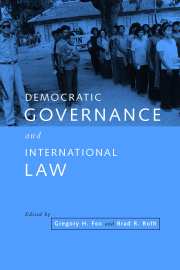Book contents
- Frontmatter
- Contents
- List of contributors
- List of acknowledgments
- Introduction: the spread of liberal democracy and its implications for international law
- PART I THE NORMATIVE FOUNDATIONS OF A RIGHT TO POLITICAL PARTICIPATION
- PART II DEMOCRACY AND INTER-STATE RELATIONS
- PART III DEMOCRACY AND THE USE OF FORCE
- PART IV DEMOCRATIZATION AND CONFLICTING IMPERATIVES
- 12 Intolerant democracies
- 13 Whose intolerance, which democracy?
- 14 Democratic intolerance: observations on Fox and Nolte
- 15 A defense of the “intolerant democracies” thesis
- 16 Democracy and accountability: the criss-crossing paths of two emerging norms
- PART V CRITICAL APPROACHES
- Index
13 - Whose intolerance, which democracy?
Published online by Cambridge University Press: 04 May 2010
- Frontmatter
- Contents
- List of contributors
- List of acknowledgments
- Introduction: the spread of liberal democracy and its implications for international law
- PART I THE NORMATIVE FOUNDATIONS OF A RIGHT TO POLITICAL PARTICIPATION
- PART II DEMOCRACY AND INTER-STATE RELATIONS
- PART III DEMOCRACY AND THE USE OF FORCE
- PART IV DEMOCRATIZATION AND CONFLICTING IMPERATIVES
- 12 Intolerant democracies
- 13 Whose intolerance, which democracy?
- 14 Democratic intolerance: observations on Fox and Nolte
- 15 A defense of the “intolerant democracies” thesis
- 16 Democracy and accountability: the criss-crossing paths of two emerging norms
- PART V CRITICAL APPROACHES
- Index
Summary
In “Intolerant Democracies,” Gregory Fox and Georg Nolte discuss the classical political theory problem of democracy's self-defense. May democracies resort to “undemocratic” means to defend their existence? While I thought the chapter an important piece in the recent stream of liberal international scholarship, I found myself in a spiral of uneasiness about the authors' main theses. Despite their moderate and balanced argumentative style, something in the authors' tone of voice, in their selfpositioning was disturbing and conflicted with the apparent neutrality and detachedness of their arguments.
I am troubled by the initial pairing of the notions of democratic government and undemocratic opposition on which their chapter relies. Such a pairing assumes an external view of the particular political conflict and fails to grasp the way it appears from the inside, to the participants involved. For clearly, political passions in the modern age are not enlisted for struggles for or against “democracy.” If interviewed, all sides would normally argue their case in terms of democracy – a “true” or “real” democracy in contrast to the opponent's distorted view. The absence of an internal perspective from the authors' account, however, bars access to aspects of the participants' lives that inform their differing constructions of “democracy.” It is not clear that any understanding of the conflict is involved – and the risk of imperialism looms large.
The authors think it useful for lawyers to underwrite governmental policies that seek to defend “democracy” against something that is not “democracy.”
- Type
- Chapter
- Information
- Democratic Governance and International Law , pp. 436 - 440Publisher: Cambridge University PressPrint publication year: 2000
- 5
- Cited by



